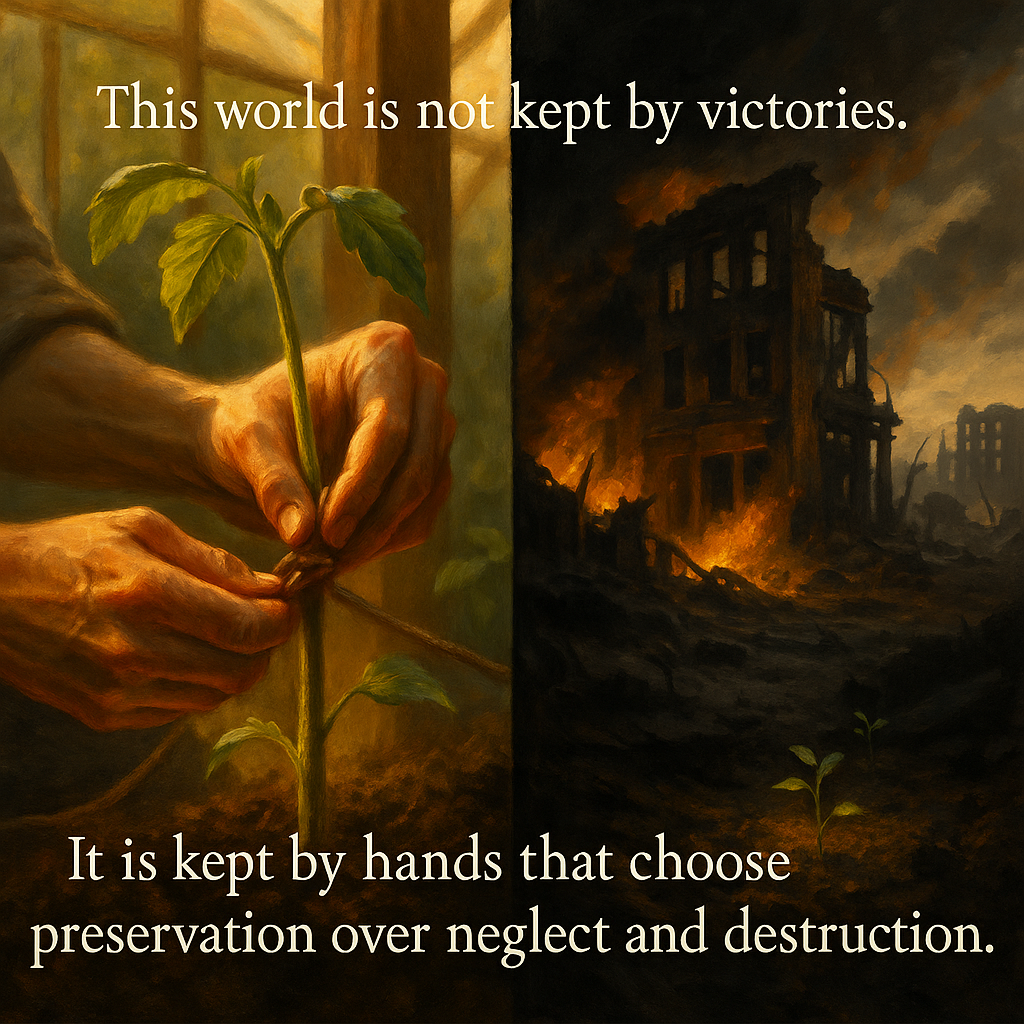
The morning light spilled gently through the repaired glass panes, slanting golden beams across the greenhouse floor. Emil paused in the doorway before entering. The night’s conversation still echoed in him—his grandfather’s words about the world as a test, not a harbor. He felt the weight of them now: every act of care or neglect was weighed not by history’s illusions of permanence, but by eternity’s quiet scales.
He looked at his hands, roughened by soil. They had seemed so small against the backdrop of war and history. But here, on the threshold of the greenhouse, he began to see them differently: they were instruments of choice. With them he could neglect or preserve, uproot or tend. And each choice, however small, was part of the test. The harbor was an illusion, but here was the test—in soil, in water, in hands that chose preservation.
Inside, the air was warm with the scent of damp earth and growing things. Lara knelt beside young Ben, guiding his clumsy fingers as they pressed soil around the roots of a basil plant. “Not too tight,” she murmured, her old command replaced with patience. “It needs space to breathe.” The boy nodded, brow furrowed in concentration. Emil saw in their exchange a small act of mercy—an answer to the test.
At another bed, Mateo and Sofia struggled with the irrigation line. A joint leaked; water spattered into the soil.
“You forced it,” Sofia said, but not in accusation.
Mateo sighed, sanding the edge smooth before trying again. No blame. No escalation.
No provocation. No fight. No war.
The greenhouse itself seemed to reject the logic of conflict. Strength was not proven by striking first, nor honor by retaliating harder. Just the slow work of correction—justice without vengeance. Here, the choice was always to still the spark before it leapt into flame.
Nearby, Leo crouched with the robotics club, watching as moisture sensors blinked to life: DRY, OK, WET. The numbers were simple, but they carried weight. In a world of distorted truths, here was a neutral measure all could trust. The soil did not lie. The sensor was a voice above the noise—a fragile shield against Absence Four.
Emil knelt at a tomato vine sagging under its own weight. With steady fingers, he tied it to a wooden stake. The plant trembled, then stood straighter, its burden eased. He touched the knot lightly and thought: this too is a test. Do I leave it to break, or do I lend it strength? Do I bind it too tightly and choke it, or tie it gently so it can grow? His choice here was no different from the choices of leaders, nations, neighbors—always the same question: will you preserve, or will you destroy?
In the shadows, Grandfather sat quietly on the bench, watching. No lecture came, no parable—only a small nod, as if to say: Yes. You see it now yourself.
When it was done, Emil sat back on his heels. Soil-stained, trembling, human—yet steady. For the first time, he understood: this was not just gardening. It was keeping. Keeping life from breaking. Keeping the fragile from being lost to neglect. Keeping hope alive in a world too ready to destroy what it cannot control.
He was not merely planting. He was becoming a keeper—of gardens, yes, but more than that: of peace, of continuity, of all that bends yet must not break.
As the session ended, the offerings began. Ben handed Lara the basil plant they had potted together. Sofia pressed a perfectly fitted irrigation piece into Mateo’s palm. They were not gifts of thanks, but signs of connection—tiny accords written in soil and plastic.
On the steps, Priya opened the ledger. She did not write “ten plants potted” or “irrigation line repaired.” Instead, her pen traced a deeper record:
April 28 — The fruit is not measured in harvest but in what did not break. A plant staked. A leak repaired without blame. A child guided, not commanded. These are the terms of our treaty.
As the students drifted away, Emil lingered, touching the knot on the tomato vine once more. His hands were not a soldier’s hands, nor a general’s. They were the hands of a keeper.
The test was not about perfection. It was not about permanence. It was here, in each small decision to tie, to mend, to guide, to preserve.
And in that moment, Emil understood: to be a gardener in a world of fire was not retreat. It was defiance. It was passing the test.

